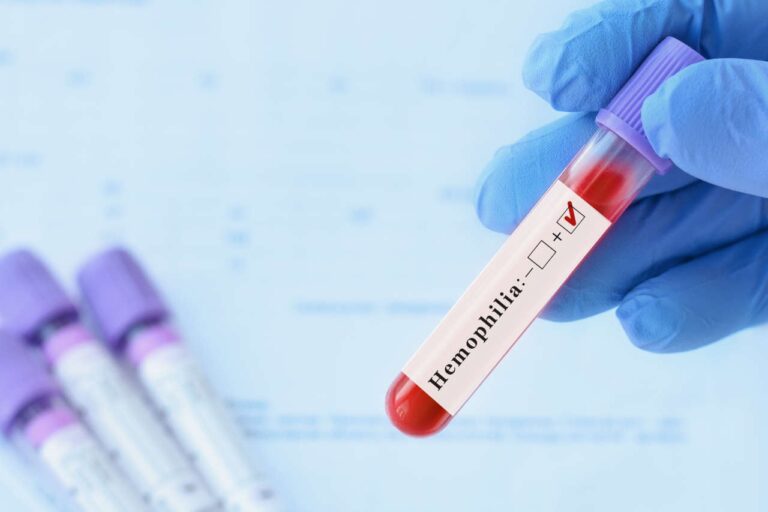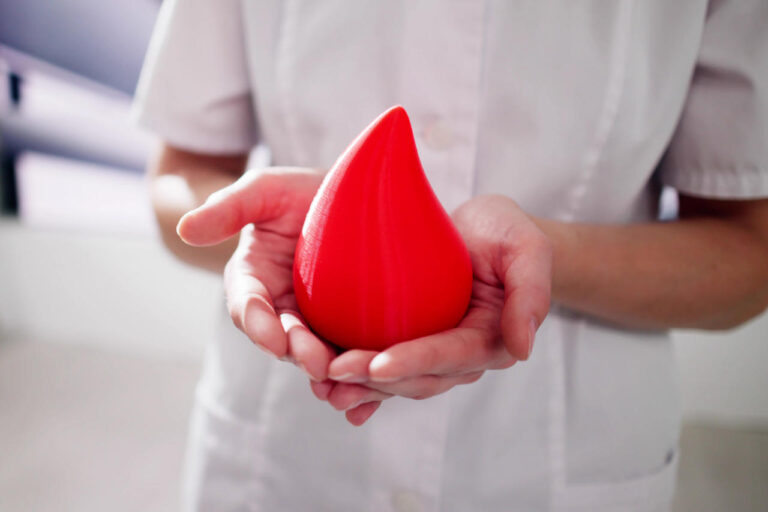
- FEIBA is a medication used for patients with hemophilia A or B who have developed inhibitors (antibodies) against their standard clotting factor treatments.
- It works by bypassing the action of these inhibitors to promote blood clotting and control or prevent bleeding episodes.
- FEIBA is administered intravenously, and the dosage is customized based on the patient’s condition and the severity of bleeding.
- While effective, FEIBA is an expensive medication and can have side effects, including a risk of serious thromboembolic events.
FEIBA (or factor 8 inhibitor bypass activity) is used in patients who have hemophilia A or B and have developed inhibitors (antibodies) against the clotting factor medications (i.e., factor VIII or IX).
Get Copay Assistance Now
Hemophilia, a genetic disorder, is treated with clotting factor medications that help control bleeding episodes in patients. However, in some cases, the patient’s bodies start to produce antibodies (inhibitors) against these drugs, neutralize their effects, and make them less effective in preventing bleeding episodes.
FEIBA, a medication also known by its generic name “anti-inhibitor coagulant complex,” works by bypassing the activity of these inhibitors and promoting blood clotting in patients with clotting factor inhibitors.
If your doctor has prescribed you FEIBA, this guide will help you learn important details about this drug. Here, you’ll learn about FEIBA’s usage, dosage, working mechanisms, associated side effects, warnings, and precautionary measures.
What is FEIBA Used for?
The FDA has approved FEIBA infusions to be used in the following conditions in patients with hemophilia A or B with inhibitors:
- To control and prevent acute bleeding episodes
- To control excessive bleeding before, during, or after a surgical procedure
- For routine prophylaxis to prevent or reduce the frequency of bleeding episodes
However, it is not indicated to treat bleeding episodes in patients who do not have inhibitors against factors VIII or IX.
Composition and Mode of Action
FEIBA is a plasma-derived product and consists of multiple activated and non-activated clotting factors, including factors II, VII, IX, and X. It promotes blood clotting even in the presence of inhibitors (antibodies) in hemophilia A or hemophilia B patients.
Patients with hemophilia A can develop antibodies against clotting factor VIII, while hemophilia B patients can develop antibodies against clotting factor IX. These antibodies (inhibitors) neutralize the effects of factor VIII or IX drugs, making them less effective in controlling or preventing bleeds.
FEIBA bypasses the activity of these inhibitors and makes sure that the blood clots properly. It is important to know that this hemophilia medication does not cure your condition but only helps to control bleeding episodes.
FEIBA Dosing and Administration
FEIBA is a medication that comes in the form of lyophilized powder in single-dose vials containing concentrations of 500, 1,000, or 2,500 units per vial.
FEIBA is administered intravenously, and the drug’s dosage is tailored based on the patient’s clinical condition and the severity of the bleeding episodes.
1. Control and Prevention of Bleeding Episodes
Patients with minor to moderate bleeds may receive a dose of 50 – 100 units/kg FEIBA infusions, which is repeated every 6 – 12 hours until bleeding is resolved.
In cases of major bleeds (i.e., severe hemorrhage), the dose of FEIBA is increased to 100 units/kg with intervals adjusted based on clinical response.
2. Surgical Prophylaxis
Patients undergoing surgical procedures receive 50 – 100 units/kg of the FEIBA medication immediately before surgery. Furthermore, additional doses may be given after the surgery, every 6 – 12 hours, until the bleeding is resolved and the damaged area is healed.
3. Routine Prophylaxis
In routine prophylaxis, a dose of 85 units/kg is administered every other day. The dose and frequency are adjusted according to the extent of bleeding and the patient’s clinical conditions.
Speak to a Specialist
FEIBA Administration Process
After receiving the appropriate instruction from a qualified healthcare professional, FEIBA can be administered by a caregiver or the patients themselves. Here are some useful tips you should follow when administering the FEIBA drug safely.
- Follow an aseptic technique to reduce the risk of IV site-related infections.
- The medication should be reconstituted with the provided diluent and administered as an intravenous infusion.
- Reconstituted products should be used immediately or stored at room temperature and used within 3 hours.
- The FEIBA infusion rate should not exceed 2 units per kilogram per minute to minimize the risk of adverse reactions.
- Patients should be monitored closely during and after administration for any signs of adverse reactions.
- Do not combine FEIBA with other medications.
Side Effects of FEIBA

All medicines can have side effects. Some side effects are minor and temporary, while some could be severe and require immediate medical attention. Some common side effects reported by >5% of people during prophylaxis trials include:
- Anemia
- Diarrhea
- Hemarthrosis
- Hepatitis B surface antibody-positive
- Nausea
- Vomiting
The serious side effects seen with this drug include hypersensitivity reactions and thromboembolic events, such as stroke, pulmonary embolism, and deep vein thrombosis.
Always consult your doctor or hemophilia treatment center if you experience any side effects after taking FEIBA.
Warning
FEIBA can cause thromboembolic events following doses above 200 units per kg per day and in patients with thrombotic risk factors. Monitoring patients receiving FEIBA infusions for signs and symptoms of thromboembolic events is important.
Contraindications
Patients who have or had a history of anaphylactic or severe hypersensitivity reactions to its components should not take this drug.
FEIBA is also contraindicated in patients suffering from a blood clotting condition called disseminated intravascular coagulation (DIC) and acute thrombosis or embolism.
Get Financial Assistance
Drug Interactions
Some drugs may interfere with FEIBA and how it works. If you are taking any other medications like antifibrinolytic agents, such as tranexamic acid and aminocaproic acid, during your treatment with FEIBA, it can increase your risk of thrombotic events.
Similarly, taking other coagulation factors and medications can affect the efficacy of FEIBA. Therefore, it is recommended to always discuss your medication profile with your doctor before getting a prescription.
Precautionary Measures
Always consult your healthcare provider before taking the drug if you are/have:
- Pregnant or plan to become pregnant
- Breastfeeding or plan to breastfeed
- Allergic to any of the FEIBA components
- Taking any over-the-counter medications, prescription medications like emicizumab, supplements, or herbal products
- Any medical problems
FEIBA: Estimated Cost
FEIBA is very expensive. The medication’s cost may vary depending on your location, insurance, and the pharmacy you visit.
Manage Hemophilia with AmeriPharma® Specialty Pharmacy
FEIBA infusions can make a big difference in the lives of those with hemophilia. And we’re here to make access to this critical medication easier.
Our URAC and ACHC-accredited specialty pharmacy provides full-service support in over 40 US states and territories, guiding you through insurance approvals and copay assistance programs to ensure you get the treatment you need when you need it.
AmeriPharma® Specialty’s patient care advocates are available 24/7 to help you with all your healthcare needs. Contact us today and let our team guide you every step of the way.












